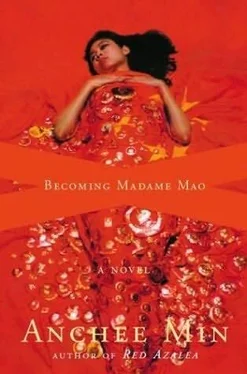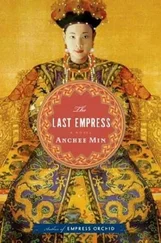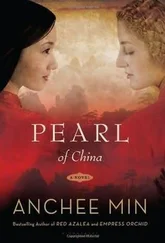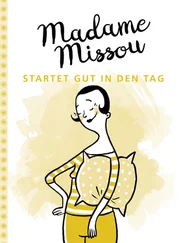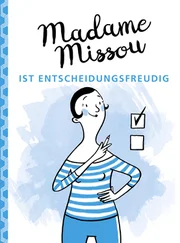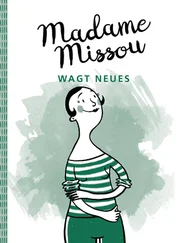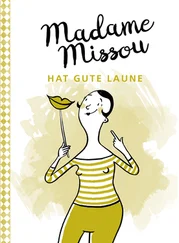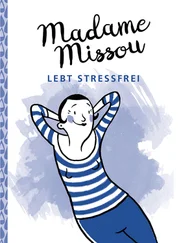Anchee Min - Becoming Madame Mao
Здесь есть возможность читать онлайн «Anchee Min - Becoming Madame Mao» весь текст электронной книги совершенно бесплатно (целиком полную версию без сокращений). В некоторых случаях можно слушать аудио, скачать через торрент в формате fb2 и присутствует краткое содержание. Жанр: Современная проза, на английском языке. Описание произведения, (предисловие) а так же отзывы посетителей доступны на портале библиотеки ЛибКат.
- Название:Becoming Madame Mao
- Автор:
- Жанр:
- Год:неизвестен
- ISBN:нет данных
- Рейтинг книги:4 / 5. Голосов: 1
-
Избранное:Добавить в избранное
- Отзывы:
-
Ваша оценка:
- 80
- 1
- 2
- 3
- 4
- 5
Becoming Madame Mao: краткое содержание, описание и аннотация
Предлагаем к чтению аннотацию, описание, краткое содержание или предисловие (зависит от того, что написал сам автор книги «Becoming Madame Mao»). Если вы не нашли необходимую информацию о книге — напишите в комментариях, мы постараемся отыскать её.
Becoming Madame Mao — читать онлайн бесплатно полную книгу (весь текст) целиком
Ниже представлен текст книги, разбитый по страницам. Система сохранения места последней прочитанной страницы, позволяет с удобством читать онлайн бесплатно книгу «Becoming Madame Mao», без необходимости каждый раз заново искать на чём Вы остановились. Поставьте закладку, и сможете в любой момент перейти на страницу, на которой закончили чтение.
Интервал:
Закладка:
18
THE DARKNESS OF THE THEATER, the rows of empty seats, the sound of drums and music soothe my nerves. I am back and forth between Beijing and Shanghai these days. I continue to scout talent and look for material to adapt. My goal is to create characters who are ardent Maoists. I am holding on-trying to make Mao see my importance, to make myself indispensable. Other people are also in a race with me for Mao's affection. I must move fast. With Mao's permission and with Kang Sheng and Lin Biao's help, I have succeeded in banning other forms of entertainment – I fill the stages with the women who I'd like to be.
Yesterday I viewed a piece entitled The Harbor. I was not only impressed by its content but in awe of its musical design. This morning I phoned the mayor of Shanghai, Chun-qiao. I asked if he knew Yu Hui-yong, the composer. I'd like to have a copy of his dossier as soon as possible.
On the night of October 4, 1969, Madame Mao turns over the pages of the dossier and is thrilled with her discovery. She learns that the thirty-seven-year-old composer has been the key creator behind some of the best operas of recent years. The next day before breakfast she tells Chun-qiao that she would like to meet Comrade Yu immediately.
Chun-qiao reports that there is an obstacle. Comrade Yu is in prison. He was arrested at the beginning of the Cultural Revolution for having been a traitor before the liberation.
Get my car and connect me with the prison head, Madame Mao orders.
The prison head tells Madame Mao that it would be difficult to release Yu. However, he immediately sends her a record of Yu's crime. The story began in 1947 when Yu was a teenager. He was a member of Mao's Liberation Army. The civil war was at its peak. Chiang Kai-shek's troops bombed the entire area of Jiao-tong and Yan-tai. Yu's division was instructed to bury their food and belongings and get ready to fight for their lives. Yu was devastated. He thought about his mother and made a decision to fulfill his wish to be a good son. Before dawn Yu found a quiet place in the village and dug a hole under a tree. He buried his food and belongings and left a note: Dear brothers of Chiang Kai-shek's troops: I might be dead by the time you discover this note. My only regret is that I am given no chance to pay piety to my aging mother. My father died when I was eight. My mother raised me all by herself and the hardship she has gone through is beyond description. My spirit will thank and bless you if you could mail this package to my mother for me. Here is the address.
To Yu's dismay the note was not found by the opposition but by his own comrades. It was reported to the Communist Party authorities. Yu was turned in and detained for six months. Later on in a deadly battle he was given a chance to prove his loyalty. He survived and was forgiven, but his record was kept by the secret intelligence.
When the Red Guards of the Music Conservatory of Shanghai discovered Yu's record they celebrated-they had never had a chance to handle a "real enemy" until now.
Large productions of Taking the Tiger Mountain by Wit and The Harbor are rehearsing in Beijing and their creator is not allowed to meet with me. I have put pressure behind my request and have demanded Mayor Chun-qiao's direct attention. I am sure Chun-qiao is experiencing difficulty. I am sure my enemies are doing this to me on purpose. They know Yu's talent. They are clear that once Yu and I get together we will be an invincible team. Yu can help me promote Maoism single-handedly. He writes, composes and directs. He has a background in folk melodies and a degree in classical Western music. He has deep roots in traditional opera and a strong sense of modernism. He is trained in composition and plays almost every instrument.
I give Chun-qiao ten days to present me with Yu. Finally, when I am in the middle of reviewing Taking the Tiger Mountain by Wit at the Hall of Mercy, Chun-qiao comes to me with the news that Yu has been escorted to Beijing.
Where is he? I ask, so excited I raise my voice. The actor on the stage thinks that I am yelling at him and swallows his lines.
Yu is in the Guest House of Beijing at the moment, Chun-qiao whispers in my ear. He is in terrible shape. He hasn't had a chance to take off the prison uniform and he smells like a chamber pot.
Send him!
A half-hour later Yu Hui-yong arrives. The moment Madame Mao Jiang Ching lays eyes on the half ghost and half man, she stands up and quickly walks up to him. She reaches out and offers both her hands. I regret not having met you earlier, Yu.
The composer/playwright begins to tremble. He is unable to utter a word. He looks like a sick old man with gray hair and messy beard. He wears a borrowed suit. How can I ever pay back your kindness, Madame? He weeps.
Let's work together, replies Madame Mao.
By now the opera has come to its end. The curtain descends and then rises. The actors line up. The audience claps. The sound becomes louder. The security people run back and forth between the stage and the audience. It is a signal for Madame Mao to get on the stage. The weeping Yu gets up and tries to make a way for his savior.
Come with me, Yu, Madame Mao says. Come with me onto the stage.
The man is shocked.
Madame Mao takes Yu's arm and pushes him, smiling.
The man follows.
On stage Madame Mao Jiang Ching centers herself with Yu standing right next to her. The two clap and pose for photos.
The romanticism in Yu's composition moves me. Being with him is like being in a dream. He is not so attractive in appearance; neither tall nor strong, he has a broad forehead and a jaw that is too square. But below the thick eyebrows is a pair of bright eyes. He inspires me as a great artist. Since he and I are from the same province, Shan-dong, we are able to reflect on our favorite childhood tunes. I invite him for tea every day. He is humble to a fault. He won't sit down without a long string of thank-yous. He won't open his mouth unless I order him to comment. He always carries a notebook and opens it when I speak. He waits on me. It makes me laugh, because he is so serious. Very silly. I tell him that I don't want to be treated like a portrait on the wall. I want him to have fun and I want myself to have fun. My life has felt too much strain already. Think of a way to relax me. Tonight we don't talk about work. Tonight we talk nonsense.
It takes him weeks to feel comfortable with me. Finally he is himself again. He starts to bring instruments to play for me at tea. Two-string violin, flute and three-string guitar. He is a gift. We chat and he hums me rice songs, drum tunes and ancient operas that imitate the sound of desert winds. Sometimes I join him. I sing arias from The Romance of the West Chamber. We tease each other and break into laughter. His voice is poor but his singing is charming. It has a style of its own. His soul is steeped in music. Like a student I ask him questions. He is the most confident in those moments. He brings me books he has written- A Collection of Drum Songs of Shan-dong, A Collection of Folk Songs of Jiao-dong, Songs of the Forest of Shan-bei and Classics of One-String Banjo.
The pleasure is enormous. Yet I can't express myself fully. My status intimidates him. There is always a distance between us. To everyone in China I am Mao's woman. No man is allowed to have personal thoughts about me. Although I would like to get closer to Yu, I withhold myself. The worst part in our friendship is that he answers me like a servant. It only makes me feel lonelier as I listen to his passionate music.
The visits continue. As much as I can I try not to mention Mao. In fact, he never asks about my life after work. I can tell that he gets curious sometimes, but he won't venture himself. We would run out of words to say. He finds excuses to depart. He is sensitive and is weak in confrontation. I beg him to stay and he insists on leaving. We do what I call "saw-movement" several times a day. Sometimes in public. People get confused when hearing me raise my voice at Yu.
Читать дальшеИнтервал:
Закладка:
Похожие книги на «Becoming Madame Mao»
Представляем Вашему вниманию похожие книги на «Becoming Madame Mao» списком для выбора. Мы отобрали схожую по названию и смыслу литературу в надежде предоставить читателям больше вариантов отыскать новые, интересные, ещё непрочитанные произведения.
Обсуждение, отзывы о книге «Becoming Madame Mao» и просто собственные мнения читателей. Оставьте ваши комментарии, напишите, что Вы думаете о произведении, его смысле или главных героях. Укажите что конкретно понравилось, а что нет, и почему Вы так считаете.
